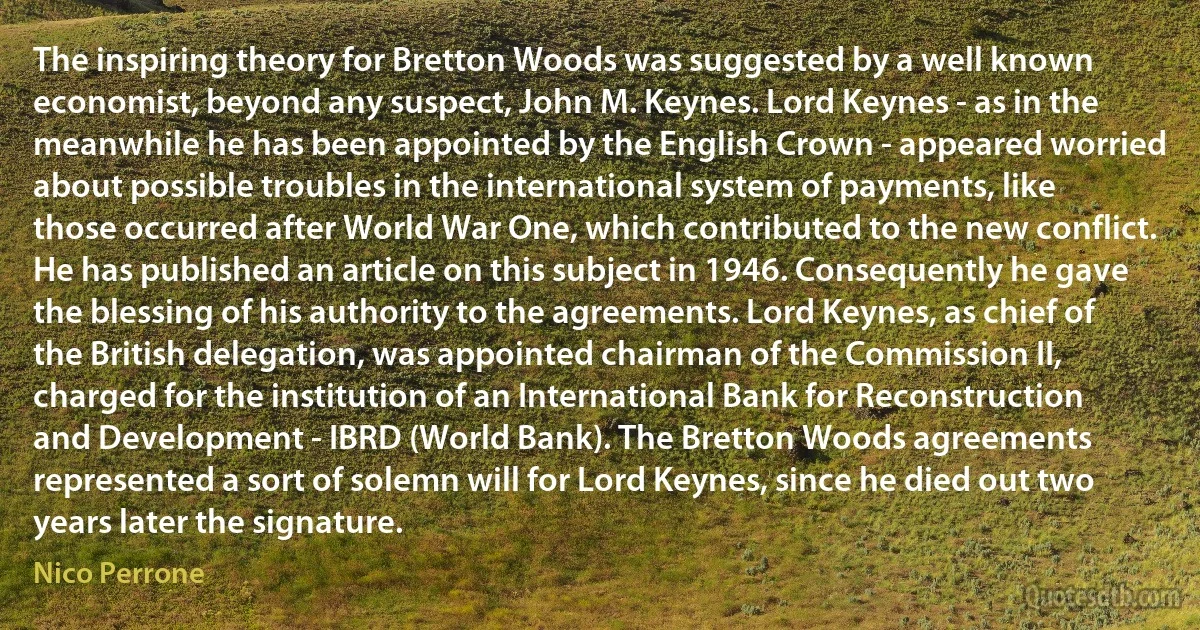
The inspiring theory for Bretton Woods was suggested by a well known economist, beyond any suspect, John M. Keynes. Lord Keynes - as in the meanwhile he has been appointed by the English Crown - appeared worried about possible troubles in the international system of payments, like those occurred after World War One, which contributed to the new conflict. He has published an article on this subject in 1946. Consequently he gave the blessing of his authority to the agreements. Lord Keynes, as chief of the British delegation, was appointed chairman of the Commission II, charged for the institution of an International Bank for Reconstruction and Development - IBRD (World Bank). The Bretton Woods agreements represented a sort of solemn will for Lord Keynes, since he died out two years later the signature.
Nico PerroneRelated topics
article authority bank beyond blessing chairman chief crown delegation development economist english inspiring institution international john known later lord meanwhile possible reconstruction signature sort suspect war well world worry years keynes woodsRelated quotes
A long decade ago economic growth was the reigning fashion of political economy. It was simultaneously the hottest subject of economic theory and research, a slogan eagerly claimed by politicians of all stripes, and a serious objective of the policies of governments. The climate of opinion has changed dramatically. Disillusioned critics indict both economic science and economic policy for blind obeisance to aggregate material "progress," and for neglect of its costly side effects. Growth, it is charged, distorts national priorities, worsens the distribution of income, and irreparably damages the environment. Paul Erlich speaks for a multitude when he says, "We must acquire a life style which has as its goal maximum freedom and happiness for the individual, not a maximum Gross National Product."

James Tobin
P. Bernays has pointed out on several occasions that, since the consistency of a system cannot be proved using means of proof weaker than those of the system itself, it is necessary to go beyond the framework of what is, in Hilbert's sense, finitary mathematics if one wants to prove the consistency of classical mathematics, or even that of classical number theory. Consequently, since finitary mathematics is defined as the mathematics in which evidence rests on what is intuitive, certain abstract notions are required for the proof of the consistency of number theory.... In the absence of a precise notion of what it means to be evident, either in the intuitive or in the abstract realm, we have no strict proof of Bernays' assertion; practically speaking, however, there can be no doubt that it is correct...

Paul Bernays
This doctrine found wide acceptance among the nonconformist clergy who later made up the Congregational Church. The great apostle of this movement was the Reverend John Wise, of Massachusetts. He was one of the leaders of the revolt against the royal governor Andros in 1687, for which he suffered imprisonment. He was a liberal in ecclesiastical controversies. He appears to have been familiar with the writings of the political scientist, Samuel Pufendorf, who was born in Saxony in 1632. Wise published a treatise, entitled "The Church's Quarrel Espoused", in 1710, which was amplified in another publication in 1717. In it he dealt with the principles of civil government. His works were reprinted in 1772 and have been declared to have been nothing less than a textbook of liberty for our Revolutionary fathers.

Calvin Coolidge
Difficult as the course is, the dangers do not come from the difficulties; they come from extremists in India and at home. I will tell you what I mean. I am firmly convinced that such writings as appear in such papers as the Daily Mail will do more to lose India for the British Empire, will do more to cause a revolutionary spirit, than anything that can be done in any way by anyone else. I got many letters, I need hardly say, of all points of view. I had a very characteristic one last week... It was from a colonel; he was an old man, you could tell that by his writing; and he used this phrase: He said, "You and Lord Irwin are negrophiles." Perhaps he was a member of the United Empire party. That is not the way to cement the Empire. This sort of thing, and the spirit behind it, will break up our Empire infallibly, and that is what I am out to fight.

Stanley Baldwin
For what advantage is it, that the world enjoys profound peace, if thou art at war with thyself? This then is the peace we should keep. If we have it, nothing from without will be able to harm us. And to this end the public peace contributes no little: whence it is said, ‘That we may lead a quiet and peaceable life.' But if any one is disturbed when there is quiet, he is a miserable creature. Seest thou that He speaks of this peace which I call the third (inner, ed.) kind? Therefore when he has said, ‘that we may lead a quiet and peaceable life,' he does not stop there, but adds ‘in all godliness and honesty.' But we cannot live in godliness and honesty, unless that peace be established. For when curious reasonings disturb our faith, what peace is there? or when spirits of uncleanness, what peace is there?

John Chrysostom
